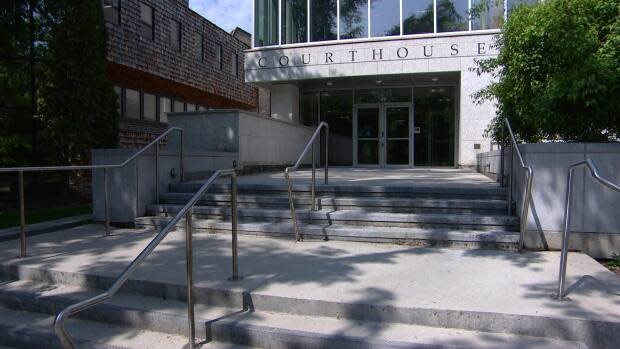Skeleton racer seeks damages, policy changes after breaking neck at Saskatoon hospital

Evan Neufeldt says better policies at a Saskatoon hospital could have prevented him from breaking his neck.
Neufeldt, a Saskatoon-based skeleton racer who has competed for Canada internationally, cycled to Royal University Hospital to get checked out after having an epileptic seizure in May 2020.
He was assessed and then left alone in a room. While he was lying in bed unattended, he had another seizure, fell off the bed and broke his neck.
Neufeldt, 35, is suing the Saskatchewan Health Authority (SHA), alleging negligence. He is seeking damages and said he hopes the case might bring policy changes to protect future patients.
Closing arguments in the case were presented Monday at Saskatoon Court of King's Bench.

Neufeldt spoke outside the courtroom after the proceedings. He said he had a long road to recovery.
"I'm lucky to have recovered as well as I did," he said. "Maybe I can help somebody who might not have luck on their side to avoid the whole situation."
His lawsuit alleges hospital staff should have used bed rails to prevent the fall.
"It was negligent of the nursing staff not to put that rail up while leaving him alone in the room, just in case he had another seizure," Jay Watson, Neufeldt's lawyer, said Monday.
Neufeldt's legal team argued that putting up railings should be a common-sense safety measure.
"The health care association has a policy of least restraint — so you use the least restraint possible — which is a great policy, but it has more to do with elderly people, people with mental health issues," Watson said. "Not someone who's otherwise healthy but has seizures."

During closing arguments, the SHA's legal team said bed rails are only used on seizure patients in an emergency, as they are considered a form of restraint.
Neufeldt was assessed multiple times, had cycled to the hospital under his own power, had normal vital signs, was not showing any indication that another seizure was imminent, and did not meet the criteria for restraints or other precautions, SHA's lawyers said.
The judge reserved his decision.
Both parties have agreed that if the lawsuit succeeds, the damages should amount to $80,000.
Neufeldt is also calling for policy changes. He said his goal throughout this legal process has been to raise awareness about epilepsy and advocate for better safety measures to protect people with seizure disorders.
Watson said the judge's decision could potentially lead to a re-evaluation of SHA policies.


